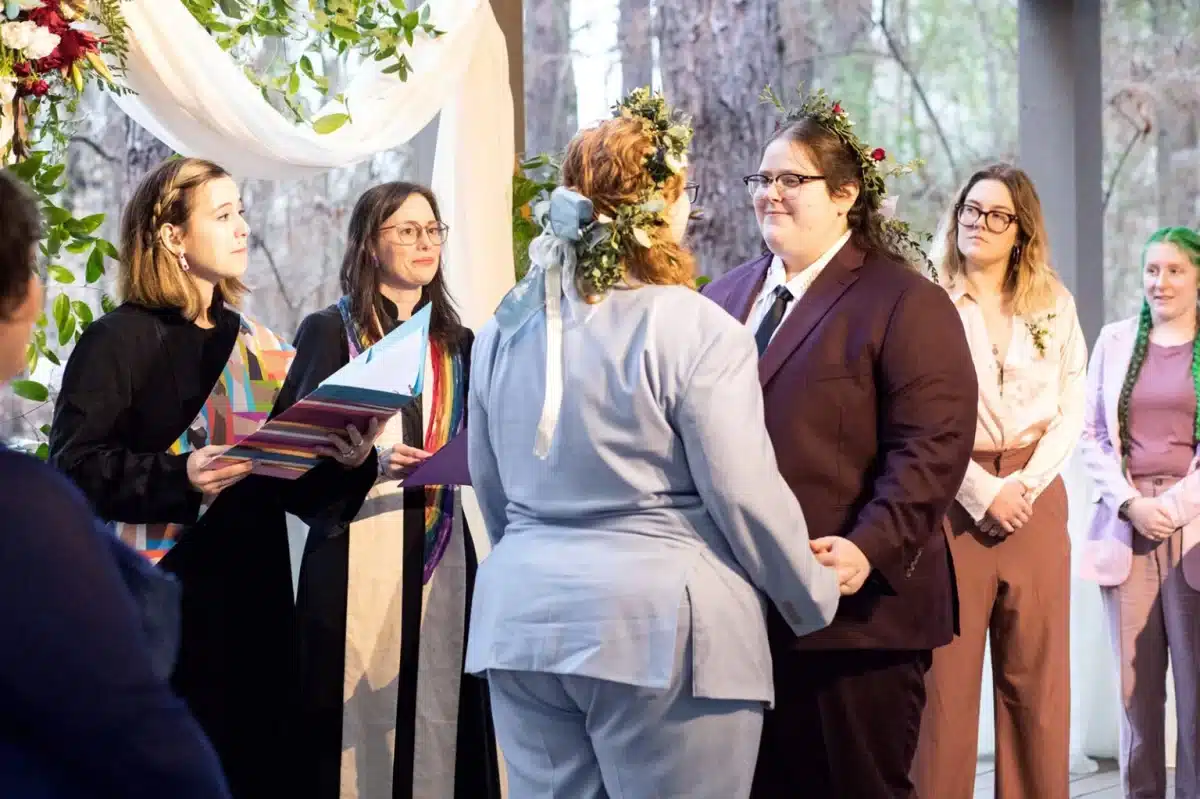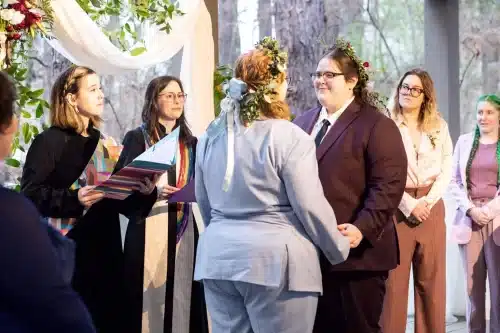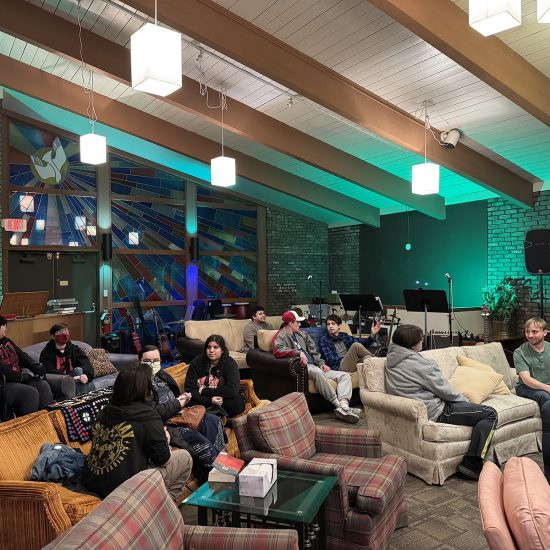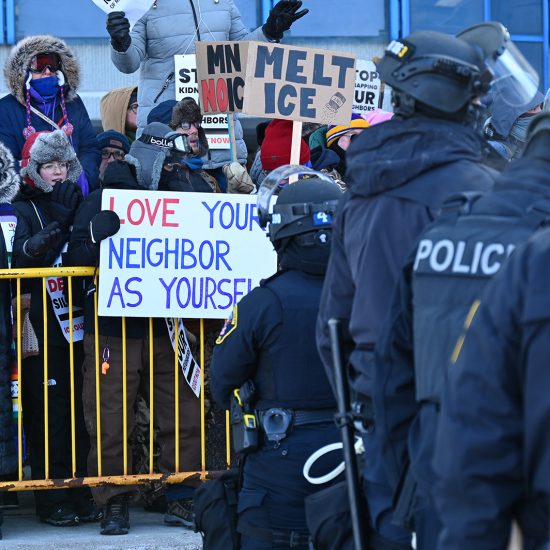
(RNS) — When Matty and Myles Cafiero were married in January in Tupelo, Mississippi, the celebration of Communion was especially important to Matty. The United Methodist Church practices an open table, inviting everyone to receive the bread and wine.
To Matty, 23, it’s a connection with both God and the people around them. It’s one of the things that drew them to Methodism.
The wedding “was everything that we wanted,” said Myles, 24.
Then came the complaint.
The two United Methodist ministers who co-officiated the Cafieros’ wedding, the Rev. Paige Swaim-Presley and the Rev. Elizabeth Davidson, say they were informed in late February a formal complaint has been filed against them, allegedly for officiating a same-sex wedding. They told Religion News Service they have been asked to surrender their clergy credentials or face a church trial in the Mississippi Conference of the United Methodist Church.
The threat of a church trial comes as the United Methodist Church is splintering over disagreement about the ordination and marriage of its LGBTQ members.
The United States’ second largest Protestant denomination has lost more than 2,000 churches since moving in 2019 to strengthen penalties for clergy performing same-sex weddings, among other things. The departing churches tend to be theologically conservative, concerned the church is moving toward affirming LGBTQ clergy and same-sex weddings, regardless.
But Matty and Myles Cafiero identify as nonbinary.

The Rev. Elizabeth Davidson, from left, and the Rev. Paige Swaim-Presley officiate at the wedding ceremony of a nonbinary couple, Matty Cafiero and their partner, Myles Cafiero, in Tupelo, Mississippi, in January 2023. Photo courtesy of the Cafieros
And Swaim-Presley and Davidson say the Book of Discipline is silent on the topic of weddings between two nonbinary people, while, on other matters, it directs deacons and elders to act according to their consciences.
In a paragraph about civil disobedience, the Book of Discipline recognizes “the right of individuals to dissent when acting under the constraint of conscience.”
Jasmine Haynes, communications specialist for the Mississippi Conference, confirmed that a complaint had been brought against Mississippi United Methodist clergypersons and said the parties involved were “properly informed of the complaint and their rights to respond under church law.”
“This has been a difficult situation for all involved persons. It is out of concern for the well-being of the complainant, the due process rights of respondents and the confidentiality of all persons involved that we are unable to discuss the nature and details of the complaint at this time,” Haynes said in an email to Religion News Service.
She did not name Swaim-Presley and Davidson or specify the subject of the complaint, which is not available publicly.
Swaim-Presley, now 40, said she was an associate chaplain in 2018 at Millsaps College in Jackson, Mississippi, when she met Matty Cafiero on the student’s first day on campus.
Matty Cafiero had left evangelical Christianity when they came out as nonbinary, they said. They had chosen Millsaps, which is affiliated with the United Methodist Church, because it was close to family, they said, not expecting Methodism to become a part of their life and studies. When theological texts came up in class readings that first semester, they realized they needed to talk through them with somebody.
They quickly became a regular — and, later, an intern — in Swaim-Presley’s office and at the Wesley Connexion, the Methodist student ministry she directed.
“Just from the first day I was there, I was met with nothing but kindness and people who were exploring just as much as me and trying to figure it all out, so it just felt like a safe place to bring all of the questions and all of the doubt and still have that core faith,” said Matty.
The next semester, Davidson, now 34, also became an associate chaplain at Millsaps and joined the Wesley Connexion as co-director.
When Matty began dating Myles, who had also grown up evangelical and attended another school nearby, they joined the student group, too.
“We always kind of joke (that) the Venn diagram of the Pride group on campus and the Wesley group on campus is kind of a circle,” Davidson said.
Many of the students in the group had had hurtful experiences when they came out in the faith communities in which they had been raised, Davidson said. Many had questions about faith and wanted to find their way back to it.
The clergy — Swaim-Presley is ordained as an elder and Davidson as a deacon — tried to create a safe space to ask questions.
“We were just really blessed,” Swaim-Presley said, “because our ministry ended up being with the kind of deep, thoughtful, searching, authentic human beings that every minister dreams of getting to pastor, and they happened to belong to the LGBTQ community on campus and in the wider Jackson area.”
When Matty and Myles asked them to officiate their wedding, she said, “it honestly never crossed my mind to even consider saying no.
“They were our students. They were our kids. And now they’re wonderful young adults.”
Both clergy had left Millsaps for nonprofit roles by the time they officiated the wedding in January.
After the complaint was filed, they said they began a supervisory process with Mississippi Bishop Sharma Lewis. But, the two claim, that process abruptly ended in late March when Lewis asked them to surrender their credentials or she would request that the conference’s board of ordained ministry place them on involuntary leave of absence and also appoint a counsel for the church to move toward a church trial.
Lewis could not be reached for comment.
Meantime, Davidson and Swaim-Presley maintain they were acting according to the Book of Discipline.
Swaim-Presley pointed out that, in addition to the right to follow their conscience, the rulebook dictates that elders must provide pastoral care and counsel. “I am not living into my ministry as an ordained person if I’m not offering these things to the people God has entrusted to my care,” she said.
Deacons also vow to keep John Wesley’s General Rules, which expect all Methodists to demonstrate their faith “by doing no harm,” Davidson said.
The Reconciling Ministries Network, a group of United Methodist congregations and individuals advocating for the full inclusion of LGBTQ United Methodists, expressed its support for Davidson and Swaim-Presley, as well as the Cafieros.
The group published a statement that reads in part, “RMN honors God’s calling, the work of the Holy Spirit, and the pastoral ministry shown by Rev. Swaim-Presley and Rev. Davidson in their decision to care for this couple. Through their participation in this wedding, they have aligned themselves with the truth that LGBTQ+ people are fully human, fully beloved by God.”
The organization is collecting donations to support the clergy’s defense through its Clergy Defense Fund.
Faith in Women — an organization concerned with “reproductive health, rights, and justice,” where Davidson is executive director — also released a statement standing with Davidson.
The Cafieros and the two clergy agree that the church’s disapproval is not what they want nonbinary and LGBTQ people to take from their story. They hope people will hear instead that God loves them, and there are pastors and other people in the church who believe the same thing.
“Matty and Myles are just like that. Their faith is such an integral part of who they are in their relationship, and their love really does carve a path — create a channel — for grace to be shared with other people in their lives and in their community,” Swaim-Presley said.
“It’s an image of what Christian marriage, I think, is meant to be.”






